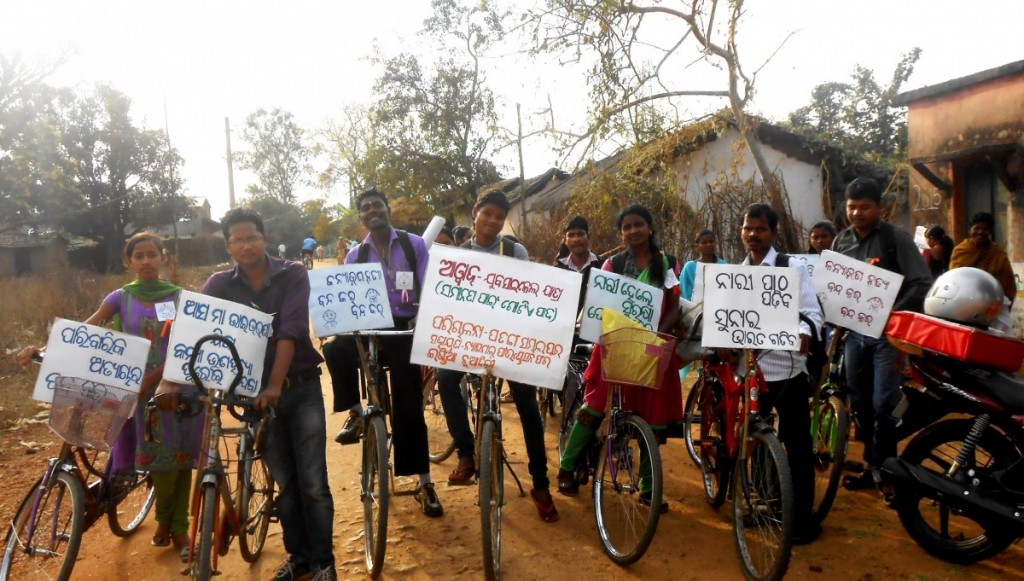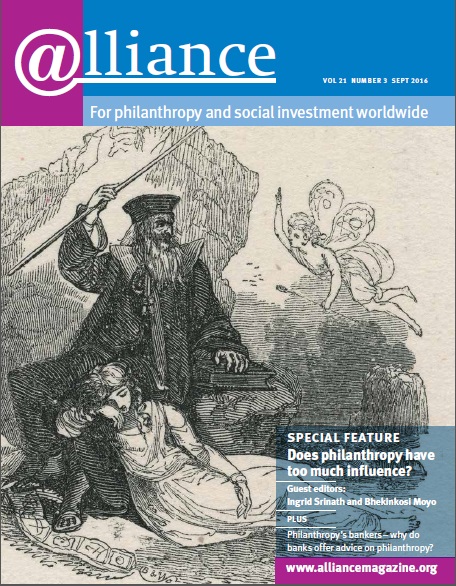Even before the recent Brexit vote, the rise of Donald Trump and the growth of so-called Islamic State it was clear we were witnessing a moment of disruption in history. While global leaders were formulating the most ambitious international developmental compact in the form of sustainable development goals (SDGs), citizens’ anger was spilling over into the streets across the world in the form of the Arab Spring, the Occupy movement and anti-corruption and anti-rape protests in Delhi. At this moment of change it becomes critical to question established narratives if we are to shape and influence emerging ones.
India’s civil society – service provider or watchdog?
India is one of the primary sites of this moment of change. As fundamentalist forces expand, we see a shrinking of liberal spaces, of the right to dissent and dialogue. At the same time we see people protesting against injustice, exclusion and poverty. Existing narratives are being reframed and new narratives are being generated. There is tremendous pressure on civil society to restrict its role to providing relief and services to the poor in the country.
‘India is one of the primary sites of this moment of change. As fundamentalist forces expand, we see a shrinking of liberal spaces, of the right to dissent and dialogue. At the same time we see people protesting against injustice, exclusion and poverty.’
Over the years India has developed a robust, if complex, civil society which is essentially geared towards deepening democracy in a highly feudal and unequal context. A fundamental premise of this role is civil society’s ability to speak truth to power and to work towards changing power relations in favour of excluded and marginalized communities and people. Civil society is rooted in the democratic ideal of ensuring popular control over power, confronting and challenging power hierarchies (including the state) and pushing for transformational change in socioeconomic and political structures. With a regulatory framework and a mainstream political narrative undermining its role as watchdog, civil society in India is currently battling to protect this narrative and its links to democratic ideals.
‘Philanthropy often remains outside these conversations on civil society and democracy. Yet it is critical to interrogate philanthropy, particularly at a time when civil society is struggling for its own space. It is critical because one of the big challenges for transformative civil society is to find resources to support its work.’
And philanthropy?
Philanthropy often remains outside these conversations on civil society and democracy. Yet it is critical to interrogate philanthropy, particularly at a time when civil society is struggling for its own space. It is critical because one of the big challenges for transformative civil society is to find resources to support its work. In India the philanthropic sector has expanded explosively in the last decade, an expansion the government of India has furthered by passing a Company’s Act which makes it mandatory for companies recording around $1 million or more annual net profit to invest a minimum of 2 per cent of their net profits in activities undertaken as corporate social responsibility. Almost none of the resources invested in this way reach the elements of civil society that are working for human rights, accountability of the state or life with dignity for all, or campaigning to empower excluded and marginalized communities. The sector may have expanded significantly, it may also be gradually integrating a developmental perspective in its work (support for education, health and livelihoods), but philanthropic discourse remains largely rooted in the idea of charity, service provision and the religious impulse behind voluntary giving. The narrative of philanthropy continues in the old mould built on the premises of religious or charitable giving.

Sambalpur, Odisha, a cycle rally on gender issues (partner organization: Patang). Credit: NFI Partners
This is a wake-up call for the Indian philanthropic sector. The sector has grown tremendously in terms of size and volume and looks set to continue to grow at a fast pace, but it has not asked fundamental questions about its role at the current crossroads of Indian (possibly global) history. The sector needs to confront some fundamental and understandably difficult questions about its role and responsibilities in relation to poverty and development in India; questions about social justice; and, most importantly, questions about the post-colonial project of building a secular, liberal, just and democratic country.
‘The real challenge is to shed the old philanthropic narrative in order to create a new narrative of philanthropy which is not limited to the ‘feel good’ impulse of giving back to society but rooted in the discourse of furthering human rights, social justice and democracy.’
The real challenge is to shed the old philanthropic narrative in order to create a new narrative of philanthropy which is not limited to the ‘feel good’ impulse of giving back to society but rooted in the discourse of furthering human rights, social justice and democracy. If the sector makes only superficial changes to the old narrative and fails to address these questions head on, it runs the risk of reinforcing existing power hierarchies and being used by entrenched interests to create the mere illusion of progress. Such a failure would strengthen the hand of those who criticize philanthropy for being essentially a means of providing the societal and political stability that capitalism needs to expand markets and profits while maintaining the status quo.
Philanthropy should focus on democracy not welfare
It could be argued that a service delivery role is important in a land with such high levels of poverty and deprivation and in which the state is unable to provide basic services to the poor and excluded. But the state has the resources to provide basic services but is deploying them neither effectively nor sincerely – a further argument for more work on state accountability. Almost all philanthropists (wealthy individuals and philanthropy professionals) acknowledge the philanthropic sector cannot provide basic services for the poor when its combined resources are not even a fraction of the country’s real requirements. Significantly, most philanthropists recognize that catering to services or mere developmental needs will address only the manifestations of poverty (and even then for only a small fraction of the population) and will not address the structural causes of poverty and exclusion. These critical insights are not, however, shaping or creating a new discourse of philanthropy.
‘If the philanthropy sector wants to be relevant and make a positive contribution to the transformational changes happening in the country and the world, it will need to reimagine its role in consonance with the ideals of democracy and to work in tandem with the progressive elements of civil society to deepen and further democracy.’
If the philanthropy sector wants to be relevant and make a positive contribution to the transformational changes happening in the country and the world, it will need to reimagine its role in consonance with the ideals of democracy and to work in tandem with the progressive elements of civil society to deepen and further democracy. It must avoid supporting elements that have the potential to undermine the project of democracy and social justice. This would be a hugely challenging path but a rewarding one. The philanthropic world needs to make a choice. Will it stand by while momentous changes happen around it or will it go beyond charities and projects and play a part in deciding how social and political power is arranged in the new world to ensure dignity and justice for all?
Amitabh Behar is executive director of the National Foundation for India. Email amitabh@nfi.org.in





Comments (1)
Well said if Democratic values are protected through philanthropy in civil society sustainable development and poverty removal can be addressed more logically.A phase shift is required in this area shailendra Tiwari